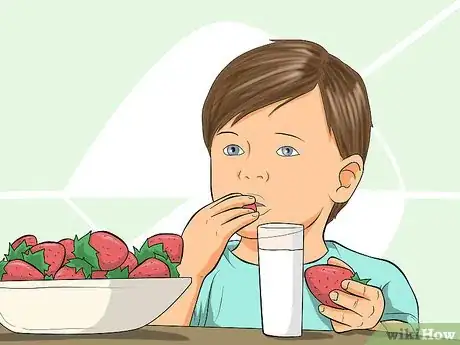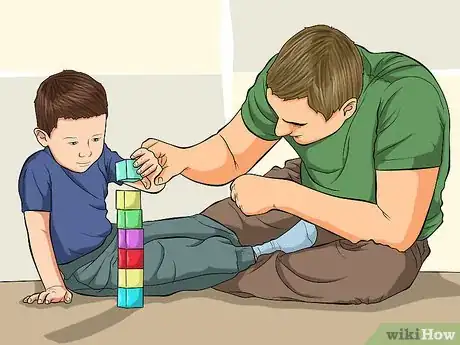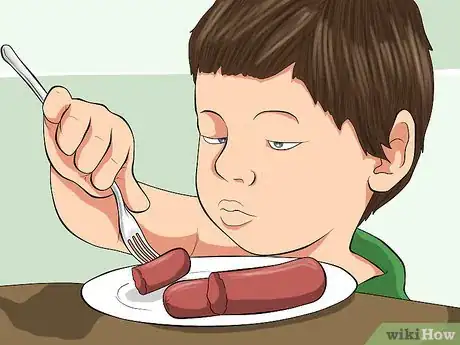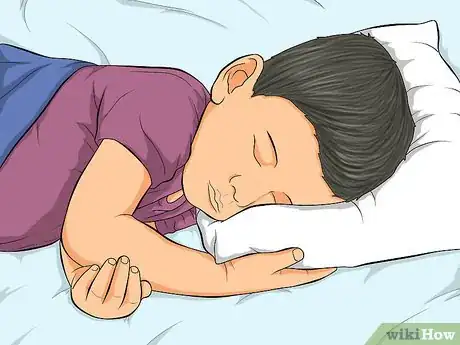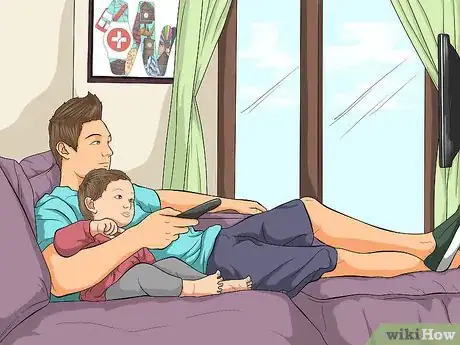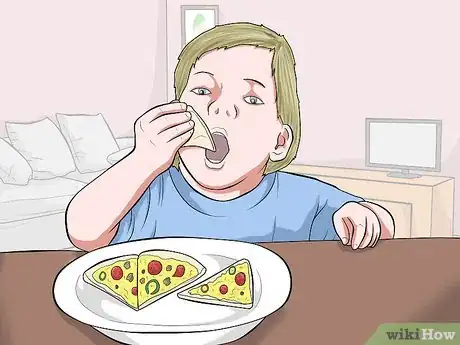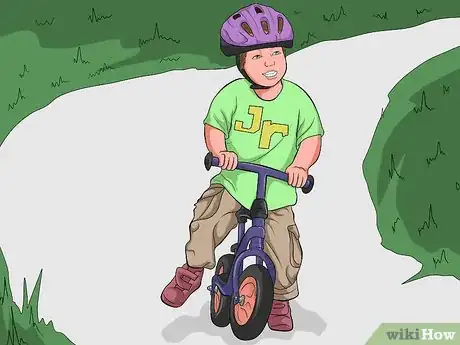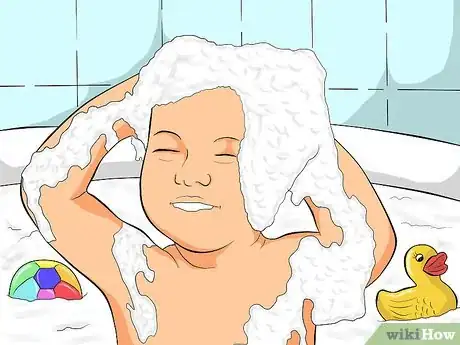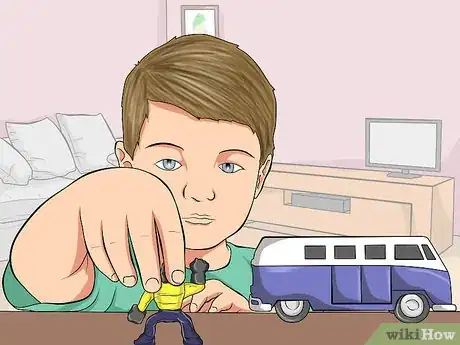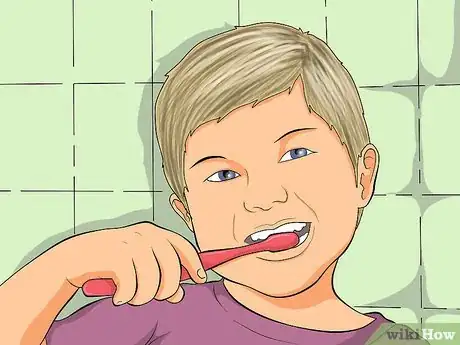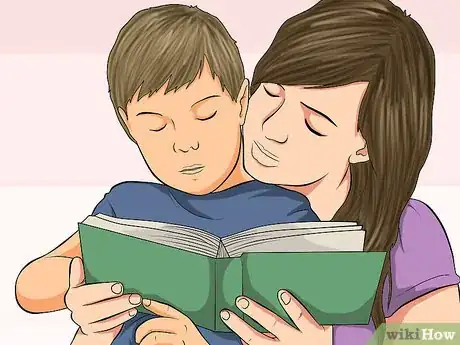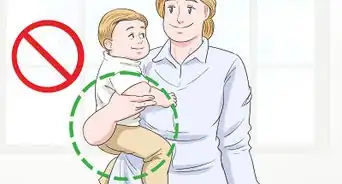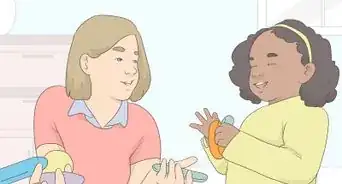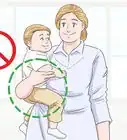X
wikiHow is a “wiki,” similar to Wikipedia, which means that many of our articles are co-written by multiple authors. To create this article, 24 people, some anonymous, worked to edit and improve it over time.
This article has been viewed 47,008 times.
Learn more...
Babysitting is no easy task, and caring for three to five year olds is another story! These kids are all different and unique, and you might find yourself at a dead end trying to figure out what to do with these children. If you are a stay at home parent or a new babysitter, read this article to help you understand what may be done for your charges to be healthy and happy!
Steps
-
1Feed them breakfast when they wake up. Make it nutritious. One idea is to give them their favorite cereal (nothing extremely sugary or fatty) with low-fat or fat-free milk and fruit. For fruit, put in bananas, blueberries, raspberries, and/or strawberries depending on what they like. Beforehand, ask the parents if the child(ren) is/are allergic to substances such as gluten or dairy.[1]
- Muffins. Ask the children if they want chocolate chip, orange, cranberry, or blueberry and make some muffins. They'll be sure to love them.
- Waffles. Make some waffles with fruit. If you know how, make waffles in a certain shape (e.g. their initial, a basic shape). You could also make pancakes.
- Parfait. Get berries, vanilla or plain yogurt, and granola to make a delicious fruit parfait!
- Fruit salad. If nothing else can be made or you're in a hurry, fruit salad is always good.
-
2Play with the child for a few hours. Play any games they like (yes, you'll have to stand being a cow for the farm whether you want to or not). If they want to go outside make sure they are properly dressed for the weather, and avoid going outside if it's too hot, too cold, or too stormy. Outdoor games to play are tag or Simon Says if they'd like to play those, or blow bubbles or color with chalk. Crafts are great as long as safety precautions are taken. If you are a babysitter or nanny and the parents are fine with this, take the kiddos to the library or an event that provides activities for their age that may even incorporate some learning.[2]Advertisement
-
3After playtime, it's time for lunch. Be sure to carefully watch children as they may touch a hot stove or other dangers. They could help choose what fruit they want on the side or to set plastic cups on the table for everyone. Suggest hot dogs, chicken fingers, or green eggs and ham ( read the book too to make it even better!). Have a healthy side too, such as grapes or carrot sticks with ranch dressing.
-
4Put them down for a nap. Make sure that they sleep so they won't be tired. If they don't sleep, tell them that they need to nap or else they will not be allowed to play after nap. After napping, your charge might be hungry, so providing a simple snack would be beneficial (try to avoid sweets and sugary foods that might wind them up). Peanut butter and apple slices or some cheese and crackers is ideal.
-
5Allow them to watch TV for an hour. Make sure that they watch age-appropriate shows, check the rating before turning it on (opt for G and PG rated shows or movies) and change the channel if something inappropriate/violent comes on. Sit with them and watch the show with them if they want, and don't give in to them if they beg for more than an hour.
-
6By now you will need to have dinner. Feed them a yummy but healthy meal, like soft tacos, chicken noodle soup, or homemade pizza. Letting them help set the table or wipe the table after eating will make them feel like they have accomplished something themselves.
-
7Let them play outside after resting. Playing right away after eating will hurt their tummy, so do something low-key, such as quietly drawing with chalk. If it's fall or winter and it gets dark early, read a few books or start picking up toys. (these are just two out of a whole bunch of low-key activities that may be done).
-
8Give them a bath. Get some play toys they like (like a rubber ducky) and give them a bubble bath if they want. Never leave a child this age alone in the bathtub, don't let the water go more than their waists, and test to make sure the water is not hot or cold.[3]
-
9Play inside with blocks, dolls, or cars until 10-15 minutes before bedtime. Have them pick up their toys if it hasn't already be done so that the house is somewhat cleaner than it was this morning.
-
10Help them get ready for bed. Make sure they brush their teeth! If they refuse to, find a picture on Google on how bad their teeth will become if they don't brush them regularly (this is not intended to scare them, just to motivate them to brush their teeth).[4] Also ask the parents if the child's hair needs to be brushed before bed, since it will be likely to have some knots in there.
-
11Read a story book or two. If they can read a little bit, have them read every couple pages or read with you at the same time. While they are asleep, go ahead and clean around the house. Looking up more fun things to do on websites such as Wikihow or Care.com will leave the possibilities endless.[5]
Advertisement
Community Q&A
-
QuestionHow to take care of a 4 year old if i am 11?
 Community AnswerJust play with them, give them food as needed and ask them what they want to do. They're at the age where if you needed to have them take a shower, they can do it by themselves but set a time limit and check in on them. Bedtime will be hard but compromise, usually you can tell them that if they don' want to go to sleep, they at least need to lie there and stay.
Community AnswerJust play with them, give them food as needed and ask them what they want to do. They're at the age where if you needed to have them take a shower, they can do it by themselves but set a time limit and check in on them. Bedtime will be hard but compromise, usually you can tell them that if they don' want to go to sleep, they at least need to lie there and stay. -
QuestionHow do I look after four-year-olds if I'm eight?
 Tessy123Community AnswerThis is hard, as parents might not allow it, and you may not have necessary skills. I would suggest you wait a few years.
Tessy123Community AnswerThis is hard, as parents might not allow it, and you may not have necessary skills. I would suggest you wait a few years. -
QuestionHow do I take care of a five-year-old if I'm 10, almost 11?
 Community AnswerYou might want to wait until you're 11, but if the parents are comfortable with you watching their child, make sure to do the following: Ask the parents ahead of time what kind of foods/snacks their child likes/is allowed to have. Ask about any allergies. Ask about favorite activities, disciplinary methods, and any limits on screen time. Then you just have to keep the child fed and entertained while you're watching her. Play games, teach her crafts, let her show you her toys, watch a show or two if she's allowed, and if it's nice out, take her outside to play for a bit.
Community AnswerYou might want to wait until you're 11, but if the parents are comfortable with you watching their child, make sure to do the following: Ask the parents ahead of time what kind of foods/snacks their child likes/is allowed to have. Ask about any allergies. Ask about favorite activities, disciplinary methods, and any limits on screen time. Then you just have to keep the child fed and entertained while you're watching her. Play games, teach her crafts, let her show you her toys, watch a show or two if she's allowed, and if it's nice out, take her outside to play for a bit.
Advertisement
Warnings
- Keep the water level in the bathtub up to their waists to prevent drowning.⧼thumbs_response⧽
- Never let the children get near any cleaning products; a child could mistake a bottle of bleach for apple juice. In case any products are swallowed or inhaled, follow the directions on the bottle and call the Poison Control Center (1-800-222-1222) for further directions.⧼thumbs_response⧽
- Make sure that the shows they are watching are appropriate!⧼thumbs_response⧽
- Always ask if the children have any allergies. Common ones are gluten, diary, nuts, shellfish, and pollen, so be sure to keep the allergic child away from anything containing these items. If an allergic reaction does occur, use an Epi-pen if trained to use one or go ahead and call the child's doctor.⧼thumbs_response⧽
- ALWAYS keep the door locked, especially before going to sleep. If you think somebody broke into the house, take the children to an upstairs room or basement and lock the door. Bar it with heavy furniture and keep the children as quiet as possible. Turn off all notifications and any sounds from your phone that could be heard, and call 911 when the thief is not nearby. If the children are on the verge of tears (and getting caught!), allow them to use a devise that has the screen brightness turned low and all sounds off.⧼thumbs_response⧽
- Don't let the kids gorge on candy and other sweet treats; this will make them more prone to sickness and will give them a higher chance of cavities!⧼thumbs_response⧽
- Don't let the children go near a hot stove, matches, lighters, or sharp appliances.⧼thumbs_response⧽
- Be certain that the water in the tub isn't too hot or too cold by dipping your elbow slightly in the water. Your elbow is more sensitive than your fingertips.⧼thumbs_response⧽
Advertisement
References
- ↑ https://www.yummytoddlerfood.com/recipes/breakfast/10-healthy-toddler-breakfasts/
- ↑ https://pediatrics.aappublications.org/content/119/1/182
- ↑ https://www.babybonus.msf.gov.sg/parentingresources/web/Babies/BabiesSafety/BabiesBath_Safety/Babies_Bath_Temperature?_afrLoop=17406567323530785&_afrWindowMode=0&_afrWindowId=null#%40%3F_afrWindowId%3Dnull%26_afrLoop%3D17406567323530785%26_afrWindowMode%3D0%26_adf.ctrl-state%3Dbyxljofe5_4
- ↑ https://www.healthhub.sg/live-healthy/1102/6-tips-to-make-brushing-teeth-fun-for-kids
- ↑ https://www.parents.com/fun/entertainment/books/the-brainy-benefits-of-bedtime-stories/
About This Article
Advertisement
